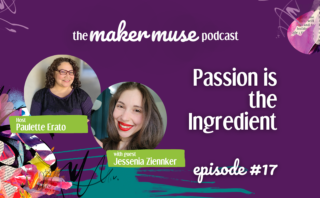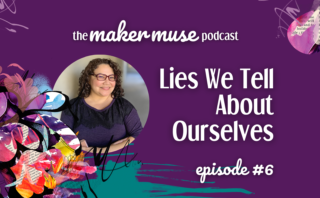Don’t get sold on those “one weird trick” hacks for improving your self-esteem or thought processes. One solid and research-backed method for that is by simply celebrating your victories, especially the small ones. In this episode you’ll find out the 3 big reasons why this is important and how to do it for yourself.
After listening to this episode, you’ll learn what’s happening in your brain when you celebrate, how depriving yourself of these celebrations hurts you, and why doing this regularly keeps you motivated and excited to get what you want.
Scroll down for a full episode transcript.
This post may contain affiliate links. For more information, please see my Disclosure Policy.*
In this episode:
- 0:37 – Get on the mailing list for future Word of the Year workshops
- 1:54 – Diary of a CEO episode with James Smith
- 2:10 – Instagram post of the interview with James Smith
Socialize online
Subscribe to the mailing list and follow The Maker Muse on:
Transcript:
0:02
Buen día and welcome to The Maker Muse Podcast! I’m Paulette Erato, the Maker Muse. And today we’re talking about celebrating all of your wins, big or small, but especially the small ones. If you haven’t already listened to episodes one and two, I highly recommend them for what we’re focusing on today. In them, I mentioned how and why your thoughts and feelings are in your control and why proof is important to your brain. So if you haven’t already, go check them out.
0:30
I don’t know about you, but I like having a word of the year. If you don’t know what that is. It’s kind of like a theme for the year. In fact, I’ll do a word of your workshop later this year, if you’re interested, just jump on my mailing list. I’ll leave a link in the show notes.
0:42
Last time, I talked about the importance of a theme song, a hype song for getting into your zone of creativity. So yeah, I like themes. And my word for this year…actually, I have two. Anyway, my words are progress and adventure. Progress, progress. It’s both a noun and a verb. I like words like that.
1:01
Anyway, progress. It’s important to celebrate progress, any kind of progress, but especially small advancements, because each step towards accomplishing a task is a sign of progress. And when you honor those small jumps, a few things happen.
1:16
One, you’re getting a happiness hit in your brain. You get flooded with neuro chemicals, all designed to make you feel good. Why wouldn’t you want that? Two every time you acknowledge that you’ve made progress, that you’ve moved forward, that’s providing proof to your brain that you are capable of doing the thing you know, whatever it is you’re working on. That proof is necessary for building habits or rewiring our brain with new neural pathways. And three, that happiness that’s flooding, your brain can even make you more productive.
1:47
So let’s break these down. Recently, Stephen Bartlett had online personal trainer James Smith on his podcast Diary of CEO, I will link to that episode in the show notes. They were talking about how all wins feel the same no matter how big or small. Whether you’re buying a quote, a Lamborghini, or brand new Golf unquote, it feels the same. You can skip to this point in the conversation over on Instagram, which will also link.
2:15
What James Smith was positing in that interview is that it does you no good, in fact you’re depriving yourself of well earned and necessary dopamine hits and pleasure if you don’t celebrate small wins. I’m a huge believer in recognizing small wins. Every Friday in my Facebook group, we have a thread where people can drop even their most tiniest small wins, and we will cheer you on. The second part of that is important to see it’s one thing to give yourself the pleasure hit to your brain by yourself. You should absolutely 100% do this at every opportunity. It’s free. There’s no quote Uber surcharge, as James mentioned in that episode, to giving yourself a hit of pleasure in the brain. But if you allow other people in to celebrate with you, you’re amplifying that feeling. It’s like sharing drugs that are totally legal without any side effects. Everyone’s morale is lifted. You know that saying a rising tide lifts all boats? That’s what sharing wins does too.
3:16
You’ll see this a lot in team sports. When someone on a team makes a good block or scores a goal, everyone on the team cheers. My favorite example of this is professional football. I’m sure it happens in other sports too, but let’s talk American football. If you’ve never seen the sport, here’s a quick explanation of the game: there are two teams 11 people on each side. So one team has the ball and the other team is trying to keep them from advancing it. The entire point of this game is to move the ball from one end of the field into the end zone on the opposite side 100 yards away. But every time a team has the ball, they get four tries to move it just 10 yards. So every time a team has the ball, they’re not trying to get all the way down. They’re just trying to get those 10 yards. Now, sometimes they might try to go further for a stretch goal, right? But the goal is 10 yards. If they move that 10 yards, they get another four tries, and so on and so forth.
4:09
So the team with the ball is trying to move 1/10 of the field, these tiny baby steps. And the other team is trying to make sure they do not do that. Okay, so that’s the point of football, you’re trying to move 10 yards every time you have the ball. And what happens every play? These big burly men and all their padding applaud one another for the smallest things. Now the big thing if they actually make it into the end zone, they jump up to the stand, say high five do dances, whatever. But we’re still talking about just moving 10 yards. Sometimes they only move like four yards and they smack each other’s helmets and high five like they just found a planet or they just birthed a child. They are so proud of themselves and their teammates! Or when the other team stops them from moving. There’s recognition of doing that good job for the smallest thing.
4:58
My point is that the smallest bit of success that each team manages on the field is congratulated, like it’s the grandest thing that has ever been done and will ever be done until the next time. So why do they do that? Because celebrating those tiny little things that happen every day successfully, is what gets you from moving just the baby step of 10 yards down the field, to getting all the way into the end zone. Celebrating keeps you motivated, it rewires the brain to believe you can get into the end zone. It’s making new freeways in your brain.
5:32
Let’s talk about actual baby steps. That’s one of those childhood milestones that’s important to track. And how do parents encourage their children to keep walking no matter how many times they lose their balance and fall on their butts? They get excited. They applaud! They cheer! They celebrate, baby steps. They celebrate baby steps. And what happens to the kid who’s trying to walk? They get excited. They want to keep receiving this reaction. Because what’s happening inside their brains is they’re also getting a hit with those happy neuro chemicals, while their brain is developing new neural pathways, so they can continue to excel at walking.
6:12
That encouragement is vital to our development. It’s the proof the young brain needs to keep doing the thing. So this reinforcement is wiring the baby’s brain that yes, this is a good thing, keep doing this thing. And this doesn’t stop when we’re older. We’re still building neural pathways in our brain all the time. We just stopped celebrating as often.
6:36
Why is that? Because we feel silly for wanting to be proud of ourselves? Because somewhere along the way, we internalize some story about how pride is bad? I’m here to tell you that’s horseshit. Be proud, recognize your accomplishments, even if they aren’t big and flashy. Cuz remember, buying the $25,000 car creates the same pleasure reaction in your brain as buying the car that costs 10 times as much. The size of the accomplishment isn’t the point. That you made one is the point.
7:09
Now, this isn’t an excuse to go 180 in the opposite direction and become a cocky motherfucker. No one likes those people. I’m not telling you to gloat. Gloating and trying to prove that you’re better than other people. That’s not what this is about. That actually comes from insecurity. And we’re not here to add to our insecurities. We’re trying to give less power to the inner critic, not more.
7:33
So now that we’ve established that recognition, and celebration are good for you, that they keep you motivated, that they help you to develop more competency, let’s talk about how that translates to productivity. And before we get into that, I’m going to let you know right off the bat that I think our culture’s obsession with being productive isn’t just bullshit. It’s straight up harmful. We aren’t robots, we’re not machines, we’re human beings. And we require rest. This entire mentality of I can sleep when I’m dead, is gross, and a terrible work ethic. The point is to work smarter, not harder, right? Because tired or miserable people don’t make for productive workers. Happy and fulfilled people do. So my aim to make you more productive is to help you become more fulfilled. Not work yourself into burnout and a collapsed central nervous system. Okay?
8:25
So here’s a quote from the Harvard Business Review:
8:28
“In our recent research on creative work inside businesses, [and] through exhaustive analysis of diaries kept by knowledge workers, we discovered the progress principle: Of all the things that can boost emotions, motivation, and perceptions during a workday, the single most important is making progress in meaningful work. And the more frequently people experience that sense of progress, the more likely they are to be creatively productive in the long run. Whether they are trying to solve a major scientific mystery or simply produce a high-quality product or service, everyday progress—even a small win—can make all the difference in how they feel and perform.”
9:09
Because you already know from episode one, that your emotions (AKA your feelings) are impacted by your perception (that’s the info that’s coming into your brain), this makes sense! And when we feel good, we’re more motivated to do the work. So what the HBR or Harvard Business Review is saying here is that all of that is reinforced and sustained when we can see measurable progress. And the more often that we see that progress, the more creative we tend to be.
9:37
What I like about this quote is that it doesn’t qualify how the progress is measured, or who is acknowledging it outside of the worker. You recognize your own progress. You don’t wait for anyone else to validate you. You celebrate your victories. I mean, sure, it’s nice when like a boss recognizes your work. And what you should do is keep a kudos file for yourself. Print out emails you receive from people who are complimenting you, whether they be peers, people above you, people below you. Keep that and review them, because you’re a chingona! And you need to remember that.
10:16
So what the HBR is saying is that when a person perceives progress in their work, they’re more motivated to keep at it. When we start seeing proof that we are reaching our goals, we’ll tend to work harder for it. And remember how the brain loves proof!
10:33
And this doesn’t just apply to your job. This is important in your creative outlets. When I first started sewing, I could not for the life of me make the stitches go in a straight line. And most new sewers start off like that, with wonky stitch lines. But with enough patience and practice, the stitching eventually straightens out. I remember the first time I sewed a straight line, I cheered that occasion up like it was Christmas! I posted about it on Instagram, I was like, look at what I can do! And that was me recognizing and celebrating my small victory.
11:08
Here we are six years later. Not only can I sew a straight line, most of the time, I can make all kinds of garments that I used to find intimidating. Hell, I just finished a bespoke jean jacket a few months ago. That was the single most time consuming and technical thing I have ever made. It took me over a month to get it done. But I knew going in that I could do it. I can hack this. I’ve proven to myself over and over in the last six years, starting with wonky stitches, that now I’m capable. I’m competent at this. I see it in the clothes hanging in my closet. See, I can see it for myself, because I’ve celebrated my wins. I’ve celebrated the small victories. I’ve seen my progress. And it keeps me going back.
11:51
So think about how you measure your progress in your own creative endeavors. What keeps you going back to what you do? And when you think about that, then I want you to start celebrating your small victories, your small wins, your progress. No matter how small it may look now.
12:13
In the meantime, here’s what I want you to take away from this episode. One, celebrating your wins is free, and it gives you a hit of feel good chemicals in your brain. Number two, celebrating your victories is a great way to establish proof for your brain that you are competent. And finally three, celebrating creates and strengthens your neural pathways to keep you excited and motivated to do more of what you want to do.
12:43
If you want to continue down this path and find your own creative core, check out the link in the show notes for my Destination: Innovation Roadmap that will help you to get there. And that’s a burrito!
12:53
Thanks for listening to The Maker Muse Podcast. I’d love if we could make this a regular thing for you and me, so please subscribe to the podcast and tell all of your family and friends about it. And I’d really appreciate it if you could rate and review it wherever you’re listening to this right now. Nos vemos!




